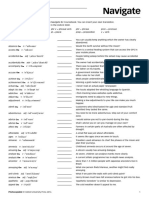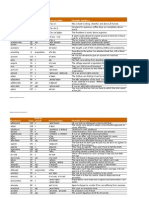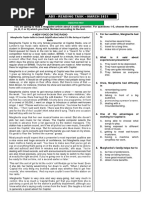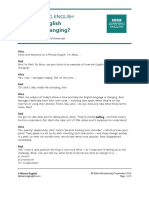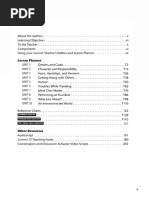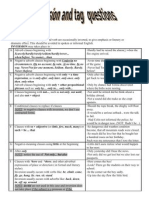Navigate Upper-Intermediate Wordlist Unit 5
Uploaded by
joel zapanaNavigate Upper-Intermediate Wordlist Unit 5
Uploaded by
joel zapanaName
Upper-intermediate Wordlist Unit 5
Here is a list of useful or new words from Unit 5 of Navigate Upper-intermediate Coursebook. You can insert your own
translation. Words marked with a key ( ) all appear in the Oxford 3000.
adj = adjective conj = conjunction phr v = phrasal verb phr = phrase pron = pronoun
adv = adverb n = noun pl = plural prep = preposition v = verb
access v /ˈækses/ Memories are stored differently from the age of seven, making
it easier to access them later.
amnesia n /æmˈniːziə/ Childhood amnesia occurs at around the age of seven.
analyse v /ˈænəlaɪz/ At seven, children can analyse events more clearly.
anti-climb adj /ˈænti klaɪm/ What if we paint the walls with anti-climb paint?
apathetic adj /ˌæpəˈθetɪk/ ‘Apathetic boredom’ is similar to depression.
army uniform n /ˈɑːmi ˌjuːnɪfɔːm/ Princess Elizabeth wore a brown army uniform, and she didn’t
look like a princess at all.
bored adj /bɔːd/ I am really bored with this lecture. It’s so dull!
bored to death phr /bɔːd tə deθ/ I was bored to death watching that film.
bulb n /bʌlb/ Wait a few seconds before touching the bulb – it may be hot.
cage n /keɪdʒ/ A group of minks were divided into two cages.
calibrating adj /ˈkælɪbreɪtɪŋ/ ‘Calibrating boredom’ is when your mind wanders from the
present situation.
can recall it very clearly phr I can recall some events from early childhood very clearly.
/kæn rɪˌkɔːl ɪt ˌveri ˈklɪəli/
can’t sit still phr /ˈkɑːnt sɪt stɪl/ I hate that feeling when you can’t sit still and you can’t wait for
the film to finish.
capable adj /ˈkeɪpəbl/ Some people worry we are no longer capable of doing nothing.
carry out phr v /ˈkæri aʊt/ The research was carried out at the University of Utah.
come up phr v /kʌm ˈʌp/ I can’t go to that boring lecture – something urgent has
come up!
come up with phr v /kʌm ˈʌp wɪð/ Psychologists came up with the idea that some people use the
left side of their brain more.
concentration n /kɒnsnˈtreɪʃn/ In some boring situations, I find myself losing concentration
after about half an hour.
convert v /kənˈvɜːt/ Self-help books promise to convert people from being
left-brained to right-brained thinkers.
definition n /ˌdefɪˈnɪʃn/ Can you give me a definition of boredom?
dental floss n /ˈdentl flɒs/ Try using a piece of dental floss to get that ring off your finger.
desire n /dɪˈzaɪə(r)/ Sometimes you have a desire to do something, but you can’t
because you’re stuck in a queue.
desperate adj /ˈdespərət/ After a long-haul flight, I’m usually desperate to get off the
plane.
die out phr v /daɪ ˈaʊt/ Some people believe that some things should be left to die out.
dream up phr v /driːm ˈʌp/ They dreamt up the right-brained/left-brained theory.
dull adj /dʌl/ Have you experienced the desire to fall asleep during a dull
lecture?
emotion n /ɪˈməʊʃn/ Boredom can be a very useful emotion.
entertain v /ˌentəˈteɪn/ We need to be constantly entertained.
experiment n /ɪkˈsperɪmənt/ Researchers pointed out that the experiments didn’t show that
animals feel truly bored.
Photocopiable © Oxford University Press 2019 1
Name
Upper-intermediate Wordlist Unit 5
fade v /feɪd/ When do childhood memories start to fade?
fed up adj /fed ˈʌp/ ‘Searching boredom’ is when you are fed up with having
nothing to do.
find out phr v /faɪnd ˈaʊt/ I’d like to find out more about the five types of boredom.
fire department n /ˈfaɪə(r) dɪpɑːtmənt/ My mum called the fire department when I was locked in the
bathroom at age two.
hand cream n /ˈhænd kriːm/ Cover your finger with something slippery like hand cream to
remove the ring.
have enough of phr /hæv ɪˈnʌf ɒv/ I’ve had enough of this TV programme.
helmet n /ˈhelmɪt/ My helmet had slipped down, so I couldn’t see a thing.
identify v /aɪˈdentɪfaɪ/ They seemed to identify some differences.
incapable adj /ɪnˈkeɪpəbl/ ‘Apathetic boredom’ means you are incapable of finding
enjoyment in life.
indifferent adj /ɪnˈdɪfrənt/ ‘Indifferent boredom’ is a pleasant feeling which allows you to
zone out after a long day.
just about remember phr I was only two, but I can just about remember it.
/dʒʌst əˈbaʊt rɪˈmembə(r)/
ladder n /ˈlædə(r)/ One of the firemen climbed up a ladder and broke through the
bathroom window.
long-haul flight n /lɒŋ hɔːl flaɪt/ For me, the most boring experiences are long-haul flights.
lose concentration phr /luːz ˌkɒnsnˈtreɪʃn/ What makes you lose concentration?
maintain v /meɪnˈteɪn/ Security cameras are expensive to maintain.
make up v /ˈmeɪk ʌp/ The right-brained/left-brained theory was largely made up by
psychologists and the media.
melody n /ˈmelədi/ The right side of the brain is best at appreciating the melody of
the music.
memory has begun to fade phr My memory of it has begun to fade.
/ˈmeməri həz bɪˈɡʌn tə feɪd/
mink n /mɪŋk/ The minks in the bare cage ate more food and slept for longer
than the other minks.
no memory whatsoever phr I have no memory of my childhood whatsoever.
/nəʊ ˌmeməri wɒtsəʊˈevə(r)/
no recollection of it phr I have absolutely no recollection of how we got home again.
/nəʊ ˌrekəˈlekʃn ɒv ɪt/
noisy adj /ˈnɔɪzi/ My main memory of the day was that it was unbelievably noisy
and happy.
nonsense n /ˈnɒnsns/ It’s all a load of nonsense.
occupied adj /ˈɒkjupaɪd/ For me, the most boring thing in the world is not being
occupied enough at work.
oxygen n /ˈɒksɪdʒən/ We used to think that we yawn to take in more oxygen to keep
ourselves awake.
packaging n /ˈpækɪdʒɪŋ/ For safe disposal of the old bulb, use the packaging of the
new one.
phase out phr v /feɪz ˈaʊt/ Let’s phase out the security cameras and install lights instead.
pop up phr v /ˈpɒp ʌp/ Google ‘right brain, left brain’, and hundreds of quizzes on this
subject will pop up.
precise adj /prɪˈsaɪs/ Can you remember the precise details of that conversation?
reactant adj /riˈæktənt/ ‘Reactant boredom’ is caused by feeling trapped in a situation.
recall v /rɪˈkɔːl/ Although I was only two, I can recall it vividly.
Photocopiable © Oxford University Press 2019 2
Name
Upper-intermediate Wordlist Unit 5
recollection n /ˌrekəˈlekʃn/ I have absolutely no recollection of how we got home again.
repetitive adj /rɪˈpetətɪv/ Doing the ironing is the most boring and repetitive of all the
household jobs.
risky adj /ˈrɪski/ ‘Searching boredom’ can result in risky behaviour.
run out phr v /rʌn ˈaʊt/ We don’t want to run out of ideas.
security camera n /sɪˈkjʊərəti ˌkæmərə/ One alternative would be to install some security cameras.
set up phr v /set ˈʌp/ Security cameras are difficult to set up.
settle v /ˈsetl/ Should we welcome the opportunity to be bored sometimes
and let our thoughts settle?
slippery adj /ˈslɪpəri/ To remove a stuck ring, cover your finger in something slippery,
such as cream or butter.
sort out phr v /sɔːt ˈaʊt/ Lights and anti-climb paint … they should sort the problem out.
steam train n /ˈstiːm treɪn/ I remember travelling on a steam train to London just after the
Second World War.
steer v /stɪə(r)/ Boredom steers us away from useless activities.
store v /stɔː(r)/ From the age of seven, children can store memories more
effectively.
swell v /swel/ Be careful not to twist the dental floss too hard or else your
finger will swell up even more.
tired of adj /ˈtaɪəd ɒv/ I’m tired of doing the same thing every day.
trapped adj /træpt/ Boredom means that you feel trapped in a situation that you’re
desperate to escape from.
turn out phr v /ˌtɜːnˈaʊt/ I thought I was four when I went to school, but it turns out I
didn’t remember it correctly.
turn up phr v /ˌtɜːn ˈʌp/ I seem to recall we just turned up and that there was no need
to book the restaurant.
understanding n /ˌʌndəˈstændɪŋ/ At seven, children have a better understanding of time and
place.
uninteresting adj /ʌnˈɪntrəstɪŋ/ I was bored because the lecture was very uninteresting.
unwind v /ˌʌnˈwaɪnd/ As you unwind the dental floss, the ring will move up your
finger until you can pull it off.
useless adj /ˈjuːsləs/ Boredom may seem like a useless emotion, but it isn’t.
vaguely remember phr I can vaguely remember going to see that film.
/ˌveɪɡli rɪˈmembə(r)/
vandalism n /ˈvændəlɪzəm/ What are we going to do about this vandalism problem?
vivid memory phr /ˌvɪvɪd ˈmeməri/ My brother has a vivid memory of our first holiday abroad.
wave v /weɪv/ They waved and waved and everyone was cheering and
singing.
work out phr v /ˈwɜːkaʊt/ There are tests designed to help you work out whether you are
right-brained or left-brained.
yawn v /jɔːn/ We seem to yawn to cool down our brain when it’s too hot.
your mind wanders phr If your mind wanders, it means you have stopped paying
/jɔː(r) maɪnd ˈwɒndəz/ attention.
zone out phr v /zəʊn ˈaʊt/ I like to zone out after a hard day’s work.
Photocopiable © Oxford University Press 2019 3
You might also like
- How Language Shapes The Way We Think by Lera Boroditsky100% (2)How Language Shapes The Way We Think by Lera Boroditsky4 pages
- Navigate Intermediate Wordlist Unit 10 PDFNo ratings yetNavigate Intermediate Wordlist Unit 10 PDF3 pages
- (B1) - Glossary - Grammar and Vocabulary - Unit 9No ratings yet(B1) - Glossary - Grammar and Vocabulary - Unit 93 pages
- Reading Fundamentals 1 - Expert EditionsNo ratings yetReading Fundamentals 1 - Expert Editions4 pages
- Vocabulary and Conceptual Knowledge: Aspects of Building VocabularyNo ratings yetVocabulary and Conceptual Knowledge: Aspects of Building Vocabulary15 pages
- A Summary Destination C1&C2 - Huynh NhuNo ratings yetA Summary Destination C1&C2 - Huynh Nhu44 pages
- t1p2 Week 6 Monitor (13 Mar 2024 A La(s) 2149)No ratings yett1p2 Week 6 Monitor (13 Mar 2024 A La(s) 2149)4 pages
- Longman English Word For Definition 2000No ratings yetLongman English Word For Definition 20005 pages
- Lowpoor Oersonal Political Staff Student Achieve Deser-Ve - Enloy Meetwith Failure100% (1)Lowpoor Oersonal Political Staff Student Achieve Deser-Ve - Enloy Meetwith Failure7 pages
- We One Another Ourselves: It You Herself YouNo ratings yetWe One Another Ourselves: It You Herself You7 pages
- Oxford 3000 Words List by Mohammad Emran RahmaniNo ratings yetOxford 3000 Words List by Mohammad Emran Rahmani38 pages
- Ad5 Objective First Reading Task Mar 2021No ratings yetAd5 Objective First Reading Task Mar 20211 page
- AD3 OBJECTIVE FIRST Reading Task Jan 2021No ratings yetAD3 OBJECTIVE FIRST Reading Task Jan 20211 page
- Navigate Intermediate Wordlist Unit 11 PDFNo ratings yetNavigate Intermediate Wordlist Unit 11 PDF2 pages
- Navigate Intermediate Wordlist Unit 9 PDFNo ratings yetNavigate Intermediate Wordlist Unit 9 PDF2 pages
- Navigate Upper-Intermediate Wordlist Unit 4No ratings yetNavigate Upper-Intermediate Wordlist Unit 43 pages
- Navigate Upper-Intermediate Wordlist Unit 12 PDFNo ratings yetNavigate Upper-Intermediate Wordlist Unit 12 PDF2 pages
- Navigate Upper-Intermediate Wordlist Unit 9 PDFNo ratings yetNavigate Upper-Intermediate Wordlist Unit 9 PDF2 pages
- Navigate Upper-Intermediate Wordlist Unit 6No ratings yetNavigate Upper-Intermediate Wordlist Unit 62 pages
- Navigate Upper-Intermediate Wordlist Unit 2No ratings yetNavigate Upper-Intermediate Wordlist Unit 24 pages
- Adverbs: An Adverb Is Any Word (Or Group of Words) That Adds Information To A VerbNo ratings yetAdverbs: An Adverb Is Any Word (Or Group of Words) That Adds Information To A Verb5 pages
- Eligibility: All Conformed Toas ( (G), (P), (T), (TG) ) of Basic Grade Having 4 Years of Regular Service in The Cadre As On 01/07/2013No ratings yetEligibility: All Conformed Toas ( (G), (P), (T), (TG) ) of Basic Grade Having 4 Years of Regular Service in The Cadre As On 01/07/20135 pages
- Grammar Guide Gerund (Ing - Form) vs. InfinitiveNo ratings yetGrammar Guide Gerund (Ing - Form) vs. Infinitive2 pages
- DGP Q2 Week 2 - 15006084.2 DGP Q2 Week 2No ratings yetDGP Q2 Week 2 - 15006084.2 DGP Q2 Week 23 pages
- Unit 1: Unit3 Unit 4 Unit 5 Unit6 Unit7 Unit 8 Unit 9 Unit 10No ratings yetUnit 1: Unit3 Unit 4 Unit 5 Unit6 Unit7 Unit 8 Unit 9 Unit 107 pages
- Notebook Module 6 Spice Up Your EnglishNo ratings yetNotebook Module 6 Spice Up Your English14 pages
- T1-C35-7A, 7B, 7C-Regular Verbs (Past Simple) PDFNo ratings yetT1-C35-7A, 7B, 7C-Regular Verbs (Past Simple) PDF10 pages
- G 8 English Complete Notes For Junior SecNo ratings yetG 8 English Complete Notes For Junior Sec50 pages
- International Islamic University Chittagong: Department of Computer Science and Engineering (CSE)No ratings yetInternational Islamic University Chittagong: Department of Computer Science and Engineering (CSE)13 pages
- Korean an Essential Grammar (Young-Key Kim-Renaud) (Z-Library)No ratings yetKorean an Essential Grammar (Young-Key Kim-Renaud) (Z-Library)273 pages
- Notes To Worksheet 1 Formal and Informal Correspondence: Learning Aims: AnswersNo ratings yetNotes To Worksheet 1 Formal and Informal Correspondence: Learning Aims: Answers1 page



